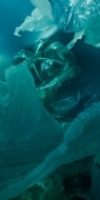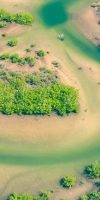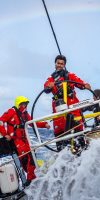Filter by:
News archive

Capturing plastic effectively by looking at the water column as a whole
The European project Maelstrom is looking for hot spots with plastic pollution. The objective is to remove as much plastic as possible from the water, recycle it and reuse it. Deltares is involved in research looking at the possibilities in an estuary in Northern Portugal. But before you start ‘fishing’, it’s a good idea to know where there is most plastic in the water.-
New global projections of tides and storm surge available based on high resolution climate models
In the coming decades, the frequency of coastal flooding will increase due to sea-level rise and changes in climate extremes, putting the millions of people living in low-lying areas at risk. The increased flooding frequency will be driven by sea-level rise, but changes in storms that generate hazardous storm surges may contribute. To inform climate mitigation and adaptation efforts, there is a need for accurate information on extreme sea levels and how they change under global warming. -
New study shows flood risk already affects 1.81 billion people
In many places of the world, flooding is expected to increase in both frequency and intensity, jeopardizing development agendas of many countries. Researchers from the World Bank, Deltares and UCL found in a new study that almost one fourth of the world population (1.81 billion people) live in locations that are exposed to at least 0.15 meters of inundation depth in a 1-in-100-year flood event. The results of their study were published in Nature Communications this week. 
Reducing the ecosystem-based carbon footprint of coastal engineering
Greenhouse gas emissions from coastal engineering do not only involve emissions from (dredging) vessels, but also from impacting sediments and coastal ecosystems. A new report by Wetlands International, developed with Witteveen+Bos and Deltares, outlines a simplified methodology for quantifying the ecosystem-based carbon footprint of coastal engineering projects. We also present potential options to reduce the carbon footprint, including through Nature-based Solutions.-
Meet the Scientific Council of Deltares
The Science Council promotes excellence and strengthens the science authority of Deltares, by reinforcing the knowledge base, by inspiring the Deltares community of researchers, by detecting and anticipating game-changers, and by stimulating sound scientific practices and products, thereby making Deltares fit for the future. -
The Netherlands has a new research facility with an advanced time machine for soil processes
Today, the unique GeoCentrifuge, a new research facility of knowledge institute Deltares, is opened. With the GeoCentrifuge, soil processes can be tested to scale by increasing gravity. What would normally take years in the ground can now be reduced to mere hours. Given the societal challenges caused by climate change, subsidence and pressure on space, this innovative research facility is vital for a resilient and sustainable infrastructure. -
Research on future-proof bridges and quays awarded by National Research Agenda
Within the Dutch National Research Agenda (NWA) 'Bridges and Quay Walls in Urban Areas' one of the research projects has been awarded to associate professor Mandy Korff (Deltares / TU Delft Civil Engineering and Geosciences (CEG)). 
New study of the relationship between climate change and socio-economic tipping points
Climate change can cause sudden socio-economic tipping points, such as large-scale bankruptcies of low-lying ski resorts, the collapse of house prices due to sea level rise, or the extensive disruption of the road network due to flooding. Kees van Ginkel (Deltares) spent four years researching tipping points of this kind. He will present the results, which have been published in various journals, at a scientific conference in Vienna (EGU) this week.-
Four ways to save deltas from sea level rise
River deltas are drowning in the face of rapidly rising sea-levels. To keep up with sea-level rise, delta land needs to be raised with sand and mud from rivers. But sand and mud supply from rivers is decreasing globally, and doesn’t make it to deltas anymore which causes flooding and land loss. -
Deltares 2022 impact report online: stories with impact
Our 2022 impact report is now online. Read nineteen stories that show how Deltares contributes to innovative and sustainable solutions for complex and urgent challenges, facing society. -
Deltares mourns passing of former managing director Maarten Smits
We are saddened by the news that Maarten Smits has passed away. Maarten Smits was the Managing Director of Deltares from 2012 to 2019. He helped lay down a stable foundation for Deltares and its strong position nationally and internationally as a knowledge institute. 
Dutch team in The Ocean Race 2022-23 will work with research world to cut carbon emissions
The Top consortium Knowledge & Innovation, TKI, is teaming up with The Ocean Race 2022-23 to reduce carbon emissions by the maritime industry. The consortium is a Dutch initiative that brings together the business world, government and knowledge institutes. During the race, high-performance sport and research will team up to collect and analyse relevant data with the aim of improving our understanding of ocean currents in places that are not easily accessible for research. This knowledge can be used to optimise offshore navigation, reducing costs and carbon emissions in the maritime industry. The preliminary results will be presented during The Ocean Race’s stopover in The Hague in June 2023.
